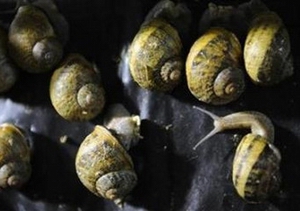 They may be the classic French delicacy - served up with garlic, parsley and butter - but most of the snails in the country's restaurants and supermarkets have actually been plucked from the fields and roadsides of Eastern Europe, say producers.
They may be the classic French delicacy - served up with garlic, parsley and butter - but most of the snails in the country's restaurants and supermarkets have actually been plucked from the fields and roadsides of Eastern Europe, say producers.Snail farmers have written to the agriculture ministry demanding a boost for their home-grown industry and clearer labelling on pre-packed "Burgundy snails" to show which ones come from France and which do not.
Up to 95 percent of them sold in France are actually cheaper and fatter varieties gathered from as far afield as the Czech Republic, Hungary, Poland and even Turkey, six French snail farmers' federations said.
"It's a French culinary speciality and it's part of our country's reputation, so we should be promoting our own snails," said senator Yves Detraigne, who is backing the campaign.
The snail campaigners have had to face up to one uncomfortable truth - that many gourmands actually prefer the plant-fattened giants slithering about in the plains of eastern Europe to the smaller ones produced in French farms.
"We perfectly understand that consumers may prefer snails from central and eastern Europe, but we cannot accept that they eat them unknowingly," the farmers wrote.
The common label "Burgundy snails" does not refer to the territory in central France but to a large white variety of edible land snail common across Europe.
The label does not have the geographic protections enjoyed by other parts of the food and drink industry, that guarantee, for example, that Champagne comes only from the eastern Champagne region.
AROMATIC BROTH
Over the past century, pesticides and changing habitats have led to a sharp fall in France's Burgundy snail population and a rise in imports and snail farming has made up the shortfall.
Burgundy snails refuse to breed if packed into farms and so can only be gathered in the wild, yet strict restrictions in place since 1979 and high labour costs mean hardly any are now picked in the French countryside.
"All we want is more traceability," said Gerard Blanchot, head of the snail farmers' federation of Burgundy and neighbouring Franche-Comte, noting that eastern European snails can be gathered cheaply due to low labour costs.
The move comes amid concern over traceability in the food chain after a Europe-wide scandal caused by horsemeat found in beef lasagne and as a law is being drafted to force restaurants to use a "homemade" label to identify dishes prepared onsite rather than bought from mass manufacturers and re-heated.
The French consume around 30,000 tonnes of snails a year, of which only 1,000 tonnes come from France's 300 snail farms.
Snail production is a labour intensive process. Once harvested, snails must be starved so that they excrete mucus then refrigerated until they fall into hibernation. They are then cleaned, scalded, pulled out of their shells and eviscerated.
Shipped frozen to one of a dozen processors in France, they are then cooked for several hours in an aromatic broth and reinserted into a clean shell, often filled with garlic-herb butter, ready to be sold to restaurants or retailers.





